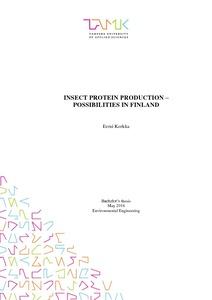Insect Protein Production - Possibilities in Finland
Korkka, Eemi (2016)
Korkka, Eemi
Tampereen ammattikorkeakoulu
2016

Creative Commons Attribution-NonCommercial-ShareAlike 1.0 Suomi
Julkaisun pysyvä osoite on
https://urn.fi/URN:NBN:fi:amk-2016062113283
https://urn.fi/URN:NBN:fi:amk-2016062113283
Tiivistelmä
This thesis gathers information from articles relating to insect farming techniques and possibilities in Europe, giving an idea how insect farming could become a more sustainable form of producing protein than currently used livestock. Comparison between traditional livestock animals is made in the fields of nutritional contents, water, energy and land usage, CO2eq emissions and feed conversion rates.
This study is done as a literature review taking relevant information from various magazines, articles, books and other sources to formulate a review of the current situation in Europe and Finland.
The research data suggest that insects, mostly mealworm and house cricket are just as or more efficient in every category than traditional livestock. This data supports the idea that implementing insect farming as a part of existing agriculture frameworks, or replacing some traditional livestock farms with insect farms, would mean less landusage and especially a lot less emissions to the atmosphere.
Finland has every possibility to adapting this relatively new field of farming if legislative problems are tackled. Making changes to current legislation or passing insects through tedious novel food regulations would provide willing farmers with a framework to start businesses in the field and thus promote entomophagy in the country.
This study is done as a literature review taking relevant information from various magazines, articles, books and other sources to formulate a review of the current situation in Europe and Finland.
The research data suggest that insects, mostly mealworm and house cricket are just as or more efficient in every category than traditional livestock. This data supports the idea that implementing insect farming as a part of existing agriculture frameworks, or replacing some traditional livestock farms with insect farms, would mean less landusage and especially a lot less emissions to the atmosphere.
Finland has every possibility to adapting this relatively new field of farming if legislative problems are tackled. Making changes to current legislation or passing insects through tedious novel food regulations would provide willing farmers with a framework to start businesses in the field and thus promote entomophagy in the country.
